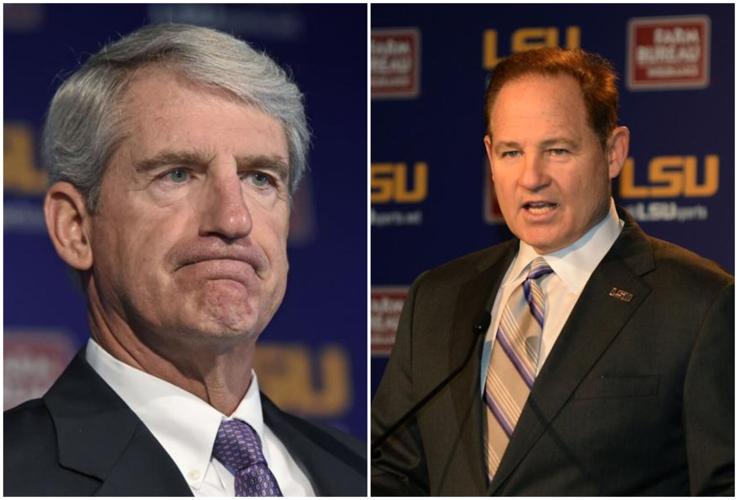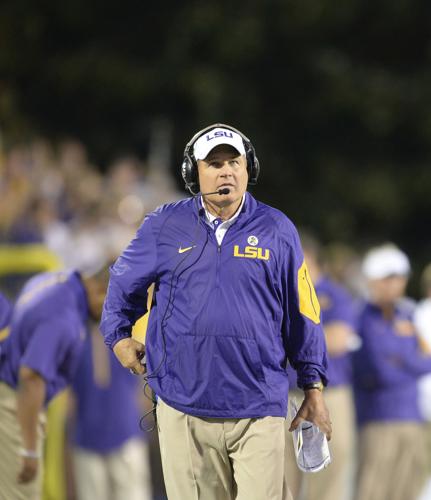Former LSU athletic director Joe Alleva recommended firing former head football coach Les Miles in 2013 because of "inappropriate behavior" that involved allegations of sexual harassment with students.
That was one of the revelations of the report released Friday by Husch Blackwell, the independent law firm LSU hired to investigate its handling of sexual misconduct cases and its Title IX policies.
The monthslong probe has prompted multiple staffing and policy changes at LSU. Interim President Tom Galligan announced Friday morning that the university is briefly suspending without pay executive deputy athletic director Verge Ausberry and senior associate athletic director Miriam Segar based on the findings.
The news also prompted Kansas athletic director Jeff Long to place Miles on administrative leave Friday night. Long, who hired Miles in 2018, did not issue a specific timeline for ultimate decisions "as we conduct a full review to determine the appropriate steps."
"Even though the allegations against him occurred at LSU, we take these matters very seriously at KU," Long said in the statement. "Now that we have access to this information, we will take the coming days to fully review the material and to see if any additional information is available. I do not want to speculate on a timeline for our review because it is imperative we do our due diligence. We will be able to comment further once our review is complete.”
The review also disclosed that Miles had been investigated by the LSU-hired Taylor Porter law firm in 2013, as recent news reports revealed. The firm turned up emails that showed Alleva, the athletic department's highest-ranking official, felt Miles should be fired based upon that investigation.
Miles had been accused of kissing a female student twice, "unwanted touching," telling her he was attracted to her and suggesting that they go to a hotel or to his condo together. Miles has repeatedly denied kissing the student or any other inappropriate behavior. Some of the other allegations in the Taylor Porter investigation remain secret; they are completely redacted.
Several LSU athletic department employees also told Taylor Porter that Miles insisted that LSU hire “attractive, blonde, fit” female students to work in recruiting. Miles was eventually forbidden from having one-on-one meetings or interactions with student employees.
But Alleva's recommendation to fire Miles -- who was riding high at the time and had just received a new six-year contract -- landed flat. The coach was terminated not for misconduct, but disappointing results on the field, early in the 2016 season.
In 2013, his supervisors directed him to stop texting, calling and messaging student employees. LSU also ordered the coach to stop hiring female students to babysit his children and to stop being alone with them. He was also made to attend eight one-hour sessions that he had to pay for and attend with an attorney.
The Husch Blackwell law firm released its report Friday detailing LSU's mishandling of sexual misconduct cases.
But Alleva, who was ousted by LSU in 2019, made clear that he felt there should've been greater consequences.
"I think his continued employment needs to be seriously considered," Alleva wrote in an email to former LSU Chancellor William Jenkins on April 19, 2013. "When reviewing the use of a secret personal phone, the text messages, the fact that I had already advised him against such behavior, the evening meeting off campus, etc. it gives me great concern for the future."
Husch Blackwell investigators were unable to locate a response to that email. Alleva has not returned messages for several weeks.
Alleva also sent an email to former LSU President F. King Alexander on June 21, 2013, in which he said he believed people are "innocent until proven guilty," but "in this case I believe (Miles) is guilty of insubordination, inappropriate behavior, putting the university, athletic dept and football program at great risk.
"I think we have cause," Alleva added. "I specifically told him not to text, call or be alone with any student workers and he obviously didn't listen. I know there are many possible outcomes and much risk either way, but I believe it is in the best interest in the long run to make a break."
Husch Blackwell investigators also were unable to find a response to that email.
Apart from Alleva, those in the loop back in 2013 included former LSU Board of Supervisors Chairman Hank Danos, chairman-elect Bobby Yarborough, athletic committee chairman Stanley Jacobs, former general counsel Shelby McKenzie and current senior associate athletic director Miriam Segar.
The Taylor Porter report noted that Miles could only be disciplined in "very limited circumstances" due to his contract.
The clause that seemed to apply was one that said Miles was to conduct himself at all times "with the high moral, ethical and academic standards" of LSU and not participate in "serious misconduct" that might impact LSU's football program and reputation.
Reached for comment Thursday, Yarborough, who no longer serves on the Board of Supervisors, said the discipline LSU settled on with Miles was "the right decision at the time" given the facts.
Former interim LSU Chancellor William Jenkins initially asked Taylor Porter to investigate Miles after the student reported the case to her supervisor, which began a reporting chain that included Segar, Alleva, then Jenkins.
The investigation was kept top secret. It took eight years, a second law firm’s investigation into how LSU has handled sexual harassment complaints and a lawsuit from USA Today to unearth the allegations against Miles.
Taylor Porter's report goes into detail about the various ways in which attorneys and LSU officials ensured it would remain under wraps, with all parties agreeing that they would never release the document unless under a court order.
The secrecy troubled Husch Blackwell investigators, who noted that LSU did not possess a file of the Miles investigation. Instead, the report was "intentionally stored offsite" at LSU's outside counsel's office and with Miles' attorneys.
Furthermore, Husch Blackwell said the fact LSU used Taylor Porter to conduct the investigation instead of handling it within LSU's Title IX office showed the case was "clearly not handled in a manner consistent with then university policy."
Taylor Porter, which still does considerable legal work with LSU, "essentially served as outside general counsel" for the university, investigators wrote, which "raises conflict of interest concerns, as it is not clear how the firm could have been neutral in the investigation."
Ultimately, Husch Blackwell disagreed with Taylor Porter's recommendations on Miles, particularly the firm's conclusions that even if one of the student's allegations were true, it wouldn't have met legal definitions for sexual harassment.
As LSU rolled out a law firm’s report Friday about a series of failures to properly report and investigate allegations of sexual misconduct an…
Husch Blackwell investigators noted that "it is difficult to meaningfully determine" the impact the university's handling of Miles had on the climate in the athletic department, but they note "it certainly was not positive."
"We are not in a position to offer an opinion on whether the allegations against him are true or not," the report said. Instead, Husch Blackwell pondered whether LSU properly responded to the report against a "powerful member" of the athletic department.
"The answer is 'no,'" the report said.
An unnamed person interviewed by the firm, which the report only reveals to be a "long-time" football staff member, said the Miles saga helped enshrine a culture where protecting athletics "kinda became the normal."
"You just don't talk about it and you don't say anything," the staffer told investigators, "you just kinda go, 'cuz we're protecting LSU, we're protecting our brand, we're protecting our head coach, we're protecting this, we love LSU so we're gonna be loyal to LSU so we're gonna do what we can to help try to fix it."
The culture within LSU's athletic department had a negative impact on the mental health of at least one employee, the report says.
After the 2013 investigation, the report says, Sharon Lewis, a longtime football operations employee who is now the associate athletic director for football recruiting and alumni relations, became so distressed by the lack of support from LSU's administration that she had a "mental breakdown" and received treatment that LSU athletics paid for.
Lewis also claimed that Miles and various other athletic department staffers "became hostile towards her." The allegations were repeatedly reported by Lewis, the Husch Blackwell report says, but she felt her reports "went nowhere."
Lewis told investigators her "worst nightmare happened" when a student worker came to her "very upset" about something that happened when she was alone with Miles, and the student asked Lewis to help her confront Miles.
Another football operations employee remembered the meeting and said she the student "had a dead stare" and kept repeating: "You know what you did to me."
Lewis said she immediately reported the incident to Segar, but, according to two employees Husch Blackwell interviewed, LSU "never did anything about it."
The student, Lewis said, "fell off the face of the Earth."
The Husch Blackwell report contained more details about how Miles insisted that student workers have a "certain look." Miles allegedly demanded that he wanted "blondes with the big boobs" and "pretty girls." Three witnesses told Husch Blackwell that Miles labeled the student workers as "a.m. and p.m. girls" and other employees recalled Miles complaining that the student workers looked like a "bad bowling team."
One unnamed witness told investigators that Miles' constant remarks normalized such demeaning comments within the athletic department.
"It makes me want to vomit," the witness said, "because it was kind of that every year it got a little worse and worse and for a while, after a while it almost became normal that we can't hire anybody fat and ugly."
LSU will release the long-awaited report from the law firm Husch Blackwell on Friday morning, detailing how the university has handled past co…
Several high-profile LSU board members and officials agreed in 2013 that LSU football coach Les Miles had a problem with sexually harassing yo…
A Baton Rouge law firm investigated former LSU head football coach Les Miles in 2013 over allegations that he sexually harassed students, and …




